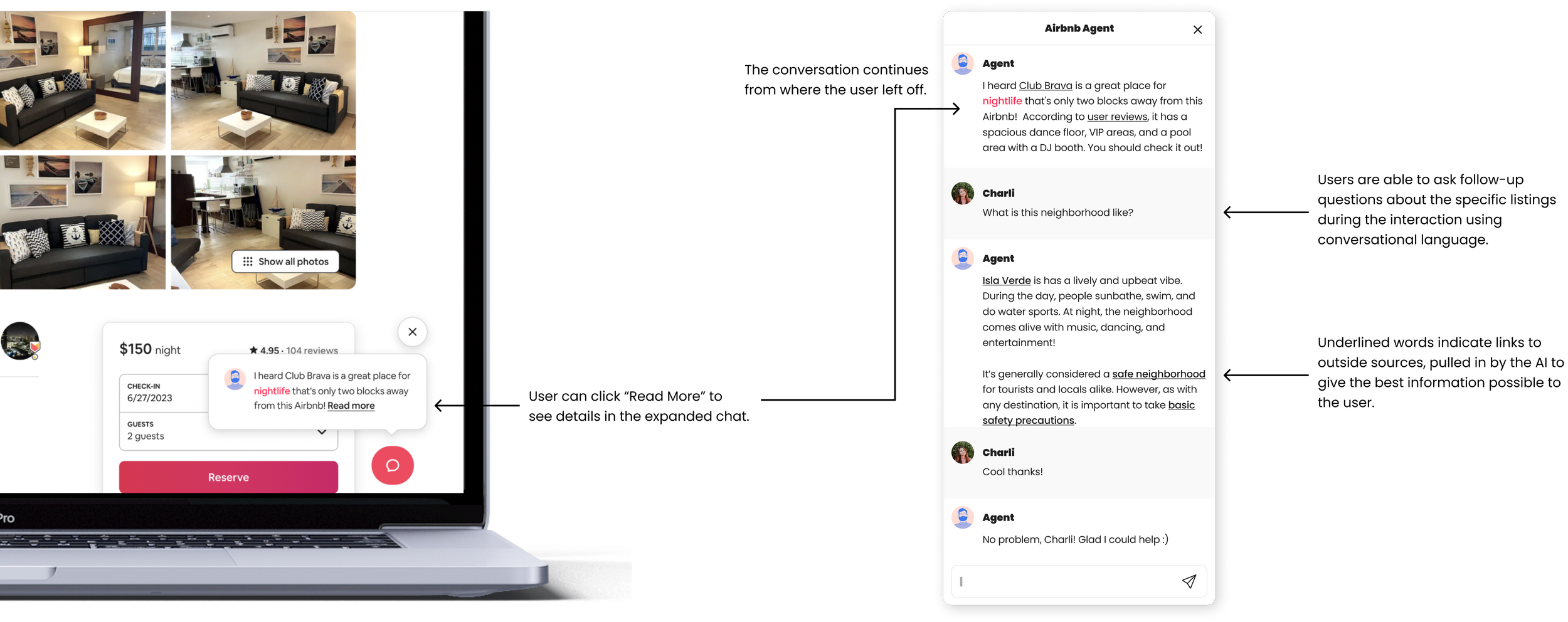Creating an AI travel agent to reduce information overload on Airbnb
My Role: UX Designer & Researcher
Project Type: Class Project
Timeline: 10 Weeks
Programs Used: Figma, Figjam, Pitch
Methods: Interaction Design, Conversation Design, Product Design
Overview
My team of six was tasked with an ambiguous design challenge regarding new opportunities for Airbnb. Our original prompt was....
"Airbnb is exploring the idea of creating a Passport service, allowing subscribers to be able to travel around the world via multiple Airbnb stays, or be digital nomads, working remotely at various locations. They need help defining the product, including positioning and design."
Over the course of the next ten weeks, we grappled with this prompt, ultimately realizing that travelers have a larger issue: information overload.
We consistently encountered user complaints centered around the challenge of making informed decisions during trip planning, due to the intricate nature of the various components involved. Typically, users find themselves conducting research across multiple platforms simultaneously, such as Google, Airbnb, Expedia, and others. This process of locating and contrasting options is time-consuming and results in frustration and even abandonment of Airbnb bookings. Users expressed a preference for a unified platform where all information is consolidated, simplifying the discovery of travel accommodations and experiences that align with their preferences.
This led to a new prompt that we defined ourselves:
“Airbnb is exploring the idea of creating an assistant service that minimizes information overload for travelers. With a personalized booking experience, travelers will find cities and Airbnbs that best suit their travel needs and desired experience.”
Evidently, there were substantial changes between these two design prompts. Over the course of the five design sprints, we engaged in repeated cycles of brainstorming, research, and decision-making. Presented below is a chronological overview of the pivotal steps undertaken during these sprints.
Introducing, Airbnb Agent
This personalized AI travel agent guides users through their browsing experience, acting as a super filter, harnessing the power of NLP to find the perfect fit on Airbnb.
Users can engage with the agent as little or as much as they want, whenever they want. If they’ve inputted a search, but are overwhelmed with the initial number of options, the Agent will help the user narrow down the options based on preferences that may not be easy to filter for.
When a user looks at an Airbnb they are interested in, the Agent can provide personalized recommendations about nearby activities, sights, or restaurants based on their previous conversations.
Throughout the conversation, the Agent can cite outside sources, indicating this by underlining words. This builds trust with users and makes sure they are getting accurate and up-to-date information.
Once a user has decided to book an Airbnb, the Agent will provide recommendations for nearby experiences, based on their interests. This allows users to easily book Airbnb Experiences, allowing them to plan multiple pieces of their trip all in one place.
Reflection
Through this project, I learned just how nonlinear the design process can be. We navigated through a very ambiguous design challenge, leveraging user research to guide our decision-making. This project highlights the importance of flexibility in design. We initially approached the challenge with certain assumptions, but as we conducted user research and engaged in brainstorming sessions, our perspectives evolved. This fluidity allowed us to pivot when necessary, no matter how difficult it is to let go of old ideas. Although our journey led us to a solution that diverged significantly from our initial concepts, I am confident that Airbnb Agent effectively tackles a genuine issue within the realm of travel booking.
Looking back on this project, it was really interesting to work on a product using cutting-edge technology. Throughout the quarter, my teammates would send updates about ways that AI/ChatGPT was being integrated into a variety of platforms including Snapchat, Notion, and Spotify. It was thrilling to see how quickly AI was adapted and how plausible our final product seemed based on the current market.
Personally, this project pushed my definition of the bounds of UX. I delved into the realm of conversation design, which was entirely new to me. This prompted me to consider how to effectively convey the desired personality of an AI travel agent, one that not only assists users functionally but also resonates with them on a human level. This meant grappling with nuanced aspects of communication, like tone, style, and pacing. Every word and phrase had to be chosen to mirror the kind of interaction that users would expect from a helpful travel agent. This exercise in crafting the personality of the AI agent highlighted the symbiotic relationship between technology and human interaction, emphasizing the importance of striking a balance between technological efficiency and a user-centered, empathetic approach.





